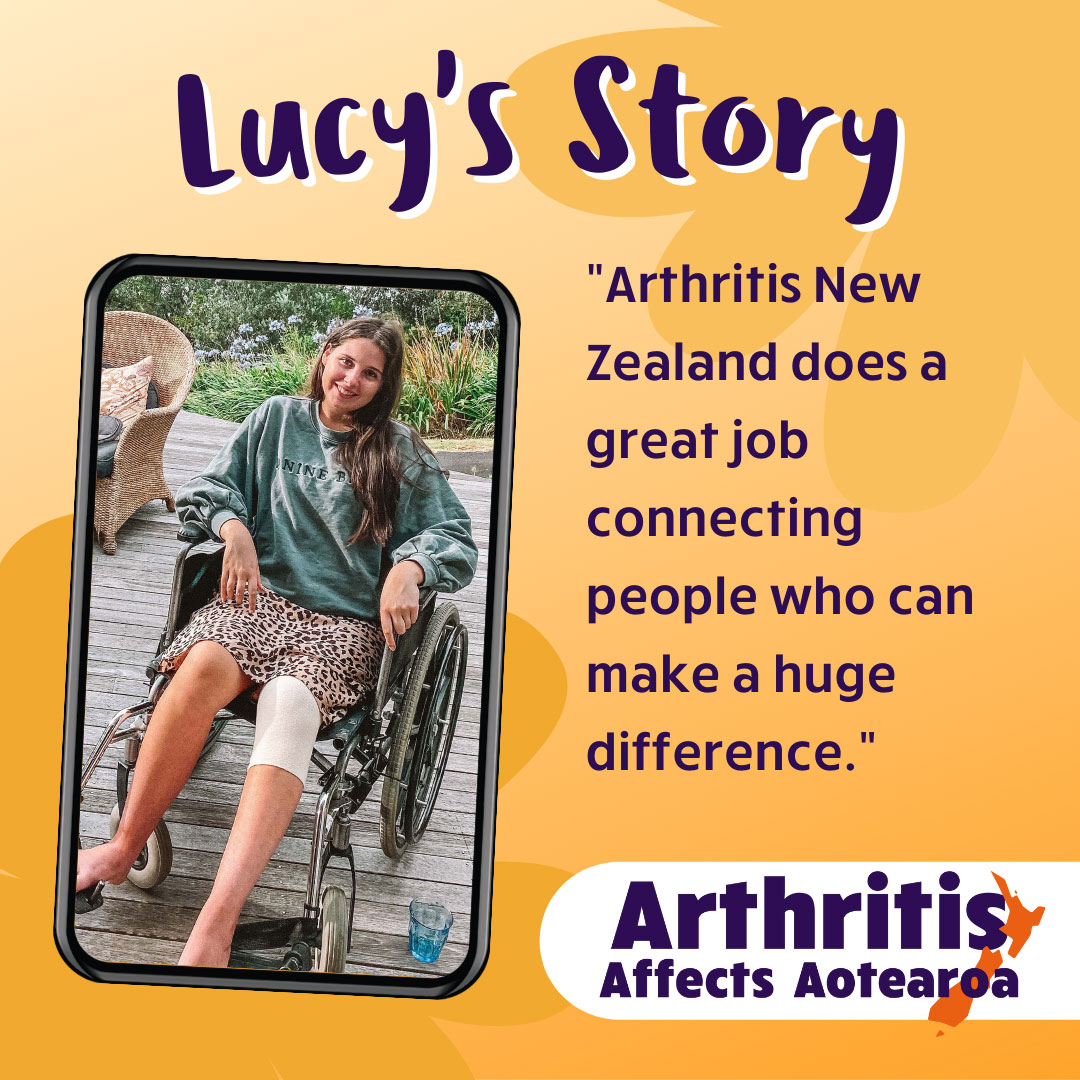Lucy Haines (23) is on her way to joining New Zealand’s law profession. She’s in her fourth year at Auckland University’s notoriously ruthless honours programme. She’s doing it all in the shadow of a recent arthritis diagnosis.
Lucy has lived most of her life with Crohn’s disease, a digestive tract condition that she compares to having a rash on her insides.
In August 2020, a hard-working and healthy Lucy did what most 22-year-olds are entitled to do and decided to let her hair down with friends. After a slightly “excessive” weekend, she came down with a bad case of strep throat and assumed it was down to overdoing it. Six days into a course of antibiotics, Lucy woke up with an intense stiffness behind her left knee and thought she’d slept awkwardly. She limped through her day at university, but the pain became near intolerable.

Her tentative diagnosis came back as reactive arthritis, and Lucy was bedridden for two months, unable to even get around the house. Doctors were initially confident that her bout of arthritis was a one-off, and she was prescribed the steroid prednisone. Pain management solutions like Tramadol, codeine, or morphine were out of the question because she was determined to continue being a student while managing her health needs.
After eight months, an optimistic Lucy travelled to Wellington to reconnect with friends. A few days later, she found herself in a hospital again.
“It’s just been such a difficult journey to navigate. You want certainty, but nobody has the answers you’re looking for. I still can’t get a clear-cut diagnosis. Things like not being able to plan social events have been challenging. You don’t just walk out of the rheumatologist’s office with a prescription and a plan.”
Lucy’s treatment has involved three drug trials, each lasting three months. Then come the constant prednisone dose adjustments and the methotrexate, a chemotherapy drug that often left her so unwell that she was bedridden four out of seven days each week.
Lucy’s new diagnosis is Seronegative Undifferentiated Spondyarthropathy, which is a type of inflammatory arthritis.
“I am on biologics that I need to inject each week and get bloods taken every two weeks for monitoring. It’s very tough, but it builds resilience,” she says.
The impact of arthritis
Arthritis is sometimes referred to as a ‘hidden’ condition because it’s often not visible on the outside. Lucy says that emotional support from close friends and family and a great medical team makes the biggest difference in managing her arthritis.
“I’ve been lucky. I’ve got an amazing psychologist, whom I’ve worked with over the last few years because I lost my dad four years ago. When you’re in crisis, you don’t want to go through your whole history with a psychologist. But of course, that’s just so expensive, and really, the overall cost of arthritis has just been immense. I’m fortunate to have my mum who can help me.”
There’s that extra layer of economic stress to deal with for people who don’t have the financial resources at hand. “And that’s where Arthritis New Zealand can offer so much. Just sharing your story with someone who understands is something everyone living with arthritis needs,” she says.
Lucy says that Arthritis New Zealand has connected her with someone who ‘gets it’, which is a huge bonus. It’s relationships that make the most significant difference, and Arthritis New Zealand does a great job connecting people who can make a huge difference.
“There is a lack of awareness around young people having inflammatory arthritis. So I want to offer my support and help raise awareness by sharing my story so that next time a young person gets diagnosed, I can be a phone call away and offer what I have learnt on my journey and be an ear to listen. Don’t take your health for granted and thank everyone who helps you through your journey, and remember, ‘we grow through what we go through’,” she says.
I want to offer my support and help raise awareness by sharing my story so that next time a young person gets diagnosed, I can be a phone call away and offer what I have learnt on my journey and be an ear to listen.
Peer Support Service
Speak to someone who has the same type of arthritis and is of a similar age as you.
The Peer Support Service is a group of trained volunteers who have arthritis and are responsible for providing non-clinical one-on-one telephone peer support to New Zealanders living with arthritis, which includes advice and experience of living with arthritis.